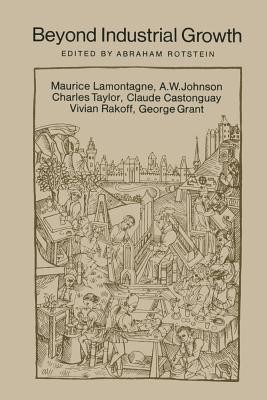
- We will send in 10–14 business days.
- Publisher: University of Toronto Press
- Year: 1976
- Pages: 148
- ISBN-10: 1487582145
- ISBN-13: 9781487582142
- Format: 15.6 x 23.4 x 0.9 cm, minkšti viršeliai
- Language: English
- SAVE -10% with code: EXTRA
Beyond Industrial Growth (e-book) (used book) | bookbook.eu
Reviews
Description
During the winter of 1974-5 six eminent Canadians were invited to lecture at Massey College on topics related to a central concern of our time -- the ability of Canadian affluence to continue to expand as it has. This book contains their various responses. The contributions are aimed at the intelligent general public rather than at specialists, and they preach neither doom nor utopia.
The first piece is by Senator Maurice Lamontagne, who states the case for 'Futures Canada' -- a study centre designed to generate ideas to help guide the country through the transition to a more stable economy.
In succeeding papers, A.W. Johnson looks for a new kind of economic thought not locked into traditional free market economics, and Charles Taylor sketches the danger -- which he thinks can be avoided -- of centralized authoritarian politics emerging as a response to difficulties.
The same democratic thrust is shown by Claude Castonguay who argues for putting more meaning back into work and politics through more participation and more regional (particularly Québécois) autonomy.
Vivian Rakoff sees little future for Marcusian cults of sexual liberation, thinking that people retain deep-seated bonds other than sex that will see them through change and keep them human, while George Grant concludes with the dissection of the false freedom and morality of modern rational-technological man.
This book responds to problems set in a global context: Canada cannot avoid the current world drama of changing attitudes, goals, and life-styles. We have to shape our communal role, agree on our wants and priorities, and know what we think and what we ought to do, if the Canadian fabric of life is somehow to survive.
EXTRA 10 % discount with code: EXTRA
The promotion ends in 23d.13:44:28
The discount code is valid when purchasing from 10 €. Discounts do not stack.
- Publisher: University of Toronto Press
- Year: 1976
- Pages: 148
- ISBN-10: 1487582145
- ISBN-13: 9781487582142
- Format: 15.6 x 23.4 x 0.9 cm, minkšti viršeliai
- Language: English English
During the winter of 1974-5 six eminent Canadians were invited to lecture at Massey College on topics related to a central concern of our time -- the ability of Canadian affluence to continue to expand as it has. This book contains their various responses. The contributions are aimed at the intelligent general public rather than at specialists, and they preach neither doom nor utopia.
The first piece is by Senator Maurice Lamontagne, who states the case for 'Futures Canada' -- a study centre designed to generate ideas to help guide the country through the transition to a more stable economy.
In succeeding papers, A.W. Johnson looks for a new kind of economic thought not locked into traditional free market economics, and Charles Taylor sketches the danger -- which he thinks can be avoided -- of centralized authoritarian politics emerging as a response to difficulties.
The same democratic thrust is shown by Claude Castonguay who argues for putting more meaning back into work and politics through more participation and more regional (particularly Québécois) autonomy.
Vivian Rakoff sees little future for Marcusian cults of sexual liberation, thinking that people retain deep-seated bonds other than sex that will see them through change and keep them human, while George Grant concludes with the dissection of the false freedom and morality of modern rational-technological man.
This book responds to problems set in a global context: Canada cannot avoid the current world drama of changing attitudes, goals, and life-styles. We have to shape our communal role, agree on our wants and priorities, and know what we think and what we ought to do, if the Canadian fabric of life is somehow to survive.


Reviews